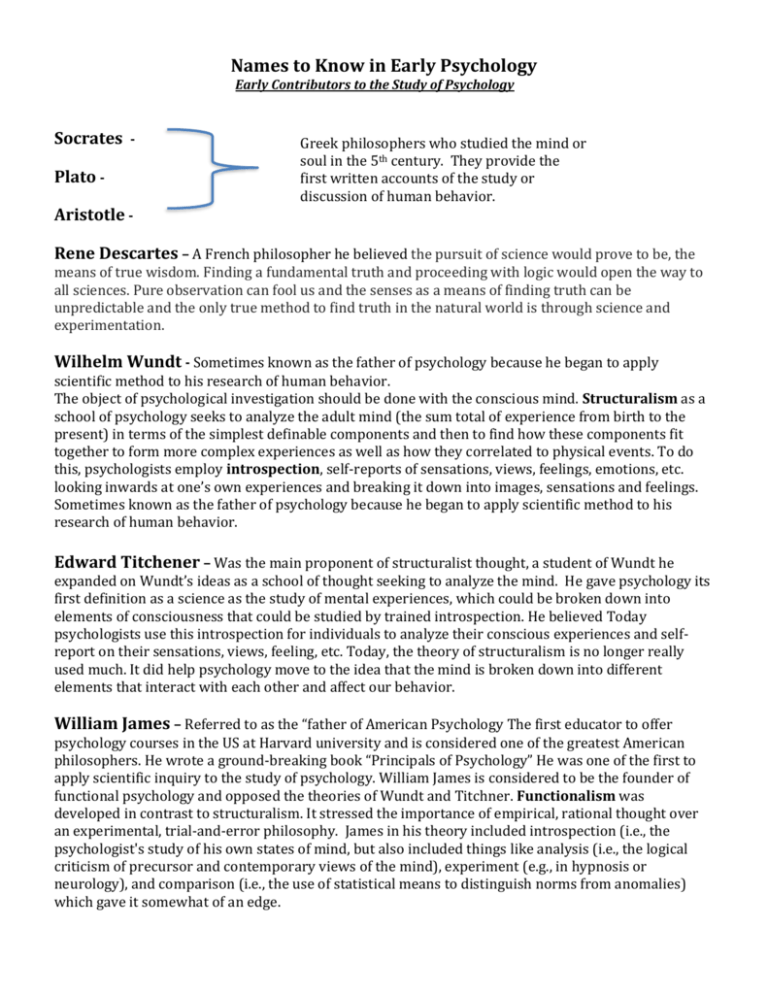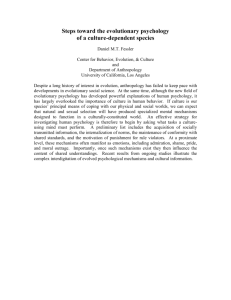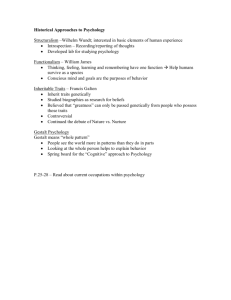Psych Names to Know - Shanghai American School
advertisement

Names to Know in Early Psychology Early Contributors to the Study of Psychology Socrates Plato Aristotle - Greek philosophers who studied the mind or soul in the 5th century. They provide the first written accounts of the study or discussion of human behavior. Rene Descartes – A French philosopher he believed the pursuit of science would prove to be, the means of true wisdom. Finding a fundamental truth and proceeding with logic would open the way to all sciences. Pure observation can fool us and the senses as a means of finding truth can be unpredictable and the only true method to find truth in the natural world is through science and experimentation. Wilhelm Wundt - Sometimes known as the father of psychology because he began to apply scientific method to his research of human behavior. The object of psychological investigation should be done with the conscious mind. Structuralism as a school of psychology seeks to analyze the adult mind (the sum total of experience from birth to the present) in terms of the simplest definable components and then to find how these components fit together to form more complex experiences as well as how they correlated to physical events. To do this, psychologists employ introspection, self-reports of sensations, views, feelings, emotions, etc. looking inwards at one’s own experiences and breaking it down into images, sensations and feelings. Sometimes known as the father of psychology because he began to apply scientific method to his research of human behavior. Edward Titchener – Was the main proponent of structuralist thought, a student of Wundt he expanded on Wundt’s ideas as a school of thought seeking to analyze the mind. He gave psychology its first definition as a science as the study of mental experiences, which could be broken down into elements of consciousness that could be studied by trained introspection. He believed Today psychologists use this introspection for individuals to analyze their conscious experiences and selfreport on their sensations, views, feeling, etc. Today, the theory of structuralism is no longer really used much. It did help psychology move to the idea that the mind is broken down into different elements that interact with each other and affect our behavior. William James – Referred to as the “father of American Psychology The first educator to offer psychology courses in the US at Harvard university and is considered one of the greatest American philosophers. He wrote a ground-breaking book “Principals of Psychology” He was one of the first to apply scientific inquiry to the study of psychology. William James is considered to be the founder of functional psychology and opposed the theories of Wundt and Titchner. Functionalism was developed in contrast to structuralism. It stressed the importance of empirical, rational thought over an experimental, trial-and-error philosophy. James in his theory included introspection (i.e., the psychologist's study of his own states of mind, but also included things like analysis (i.e., the logical criticism of precursor and contemporary views of the mind), experiment (e.g., in hypnosis or neurology), and comparison (i.e., the use of statistical means to distinguish norms from anomalies) which gave it somewhat of an edge. Charles Darwin - Darwin has been described as one of the most influential figures in human history. Evolutionary psychology has its historical roots in Charles Darwin’s theory of natural selection. In The Origin of Species, Darwin predicted that psychology (human behavior) has an evolutionary basis: Evolutionary psychology is an approach that views human nature as the product of a universal set of evolved psychological adaptations. Evolutionary psychology seeks to integrate psychology into the other natural sciences, thus understanding psychology as a branch of biology. Evolutionary adaptation is the scientific attempt to integrate a research framework for the psychological, social, and behavioral sciences. Basically, Darwin’s work laid the foundation for some of today’s fields of psychology: such as cognitive, social, developmental and evolutionary. Our brain and behavior (mental processes) is basically the way it is, because of evolutionary and adaptive pressure from our environment. It is the basis of the nature vs. nurture question. Sigmund Freud – An Austrian neurologist who became known as the founding father of psychoanalysis. Freud viewed human behavior as driven by powerful mental conflicts locked deep within the subconscious mind. He thought most people were riddled with conflicts between their own needs and societies demands. He believed much of an individual’s pain; discomfort, unexplainable behavior or mental illness was brought about by the suppression of these unconscious thoughts and that we have little insight into what drives our behavior. We are clueless about what motivates our own behavior. He believed that through psychoanalysis therapy or hypnosis he could relieve a patients discomfort, mental pain or illness by helping us understand what motivates our behavior. Freud believed that this interplay of the Id, Ego and Super Ego were at the root of personality problems. According to psychoanalytical theory, at the root of your personality are powerful inner forces that drive your behavior. Freud’s theories influenced psychology for many years particularly a Swiss psychologist Carl Jung. John Watson - An American psychologist who established the psychological school of behaviorism. Watson promoted a change in psychology through his behaviorist approach. Watson conducted research on animal behavior, child rearing, and advertising. In addition, he conducted the controversial "Little Albert" experiment. He was also editor of Psychological Review from 1910 to 1915. He played an important role in developing psychology into a credible field of study. To Watson, behaviorism was based on the idea that a methodology could transform psychology into a science. He wanted to make psychology more scientifically acceptable. Watson became interested in the work of Ivan Pavlov and classical conditioning in 1913 published he the article “Psychology as the Behaviorist Views It”. Thus began the new philosophy of psychology called “behaviorism” which basically proposed that human behavior was a conditioned response to environmental stimulus. It was Watson's new behaviorism that would pave the way for further advancements in psychology. Pierre Cabanis – (1757-1808) Was a French physiologist and materialist philosopher. Cabanis’ early contribution to psychology was to begin to bring the science of physiology and biology into psychology. Helping to link psychology with the natural sciences as opposed to a philosophy. Helping set the foundation of psychology as a science as opposed to a philosophy of the mind. Gustav Fechner - Fechner published in 1860 what is considered to be the first work of experimental psychology, "Elemente der Psychophysik." Some historians date the beginning of experimental psychology from the publication of "Elemente." Fechner was profoundly interested in establishing a scientific study of the mind-body relationship.




